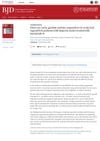 August 2024 in “JAMA Dermatology”
August 2024 in “JAMA Dermatology” Continuous baricitinib is needed to keep hair regrowth in severe alopecia areata.
 February 2024 in “Journal of the European Academy of Dermatology and Venereology”
February 2024 in “Journal of the European Academy of Dermatology and Venereology” Baricitinib is effective and safe for long-term use in severe alopecia areata, improving hair regrowth and quality of life with few side effects.
 December 2023 in “Acta dermato-venereologica”
December 2023 in “Acta dermato-venereologica” Tofacitinib is effective for treating alopecia areata, and starting treatment early may improve results.
 November 2023 in “British Journal of Dermatology”
November 2023 in “British Journal of Dermatology” Different people with severe hair loss respond to baricitinib treatment at different times, with some showing improvement early, some gradually, and others later.
 1 citations,
August 2023 in “JAMA Dermatology”
1 citations,
August 2023 in “JAMA Dermatology” Increasing the dose of baricitinib to 4 mg helps more patients with severe alopecia areata regrow hair.
 7 citations,
April 2023 in “Frontiers in immunology”
7 citations,
April 2023 in “Frontiers in immunology” Oral baricitinib and ruxolitinib are effective and safe for treating alopecia areata.
 20 citations,
March 2023 in “American Journal of Clinical Dermatology”
20 citations,
March 2023 in “American Journal of Clinical Dermatology” Baricitinib improved severe hair loss in adults over 52 weeks and was safe to use.
 6 citations,
February 2023 in “Journal of the American Academy of Dermatology”
6 citations,
February 2023 in “Journal of the American Academy of Dermatology” Upadacitinib improved hair regrowth and quality of life in alopecia areata patients with minimal side effects.
 1 citations,
January 2023 in “SAGE open medical case reports”
1 citations,
January 2023 in “SAGE open medical case reports” A new treatment called deucravacitinib helped a patient with severe hair loss grow their hair back quickly.
 40 citations,
August 2022 in “Frontiers in immunology”
40 citations,
August 2022 in “Frontiers in immunology” Blocking JAK/STAT pathways can help treat hair loss from alopecia areata.
 148 citations,
March 2022 in “The New England Journal of Medicine”
148 citations,
March 2022 in “The New England Journal of Medicine” Baricitinib was effective in treating alopecia areata in two major trials.
20 citations,
December 2021 in “Journal of the American Academy of Dermatology” Continuous treatment with ritlecitinib and brepocitinib is needed to maintain hair regrowth in alopecia areata.
 9 citations,
May 2021 in “International Journal of Dermatology”
9 citations,
May 2021 in “International Journal of Dermatology” The trial showed that a new under-the-tongue treatment for severe hair loss was somewhat effective in a small group of people.
 66 citations,
December 2018 in “Dermatology”
66 citations,
December 2018 in “Dermatology” Both ruxolitinib and tofacitinib are effective and safe for treating severe alopecia areata, but relapses are common.
 49 citations,
August 2018 in “International Journal of Dermatology”
49 citations,
August 2018 in “International Journal of Dermatology” Topical JAK inhibitors may help treat alopecia universalis by promoting hair regrowth.
 130 citations,
February 2018 in “Journal of Investigative Dermatology”
130 citations,
February 2018 in “Journal of Investigative Dermatology” Tofacitinib may help treat severe hair loss, but more research is needed.
 238 citations,
November 2016 in “Journal of The American Academy of Dermatology”
238 citations,
November 2016 in “Journal of The American Academy of Dermatology” Tofacitinib is effective and safe for severe hair loss, but full regrowth is less likely after 10 years of hair loss.
56 citations,
October 2016 in “Journal of dermatological science” New insights into the causes and treatments for the autoimmune hair loss condition Alopecia areata have been made.
 196 citations,
September 2016 in “JCI insight”
196 citations,
September 2016 in “JCI insight” Ruxolitinib effectively regrows hair in most patients with severe hair loss.
 222 citations,
September 2016 in “JCI insight”
222 citations,
September 2016 in “JCI insight” Tofacitinib is safe and effective for severe alopecia areata, but hair loss may return 2 months after stopping treatment.
701 citations,
August 2014 in “Nature medicine” Alopecia areata can be reversed by JAK inhibitors, promoting hair regrowth.
 185 citations,
June 2014 in “Journal of Investigative Dermatology”
185 citations,
June 2014 in “Journal of Investigative Dermatology” A man with severe hair loss and skin disease regrew his hair with no side effects after taking tofacitinib.
717 citations,
June 2010 in “Nature” Alopecia areata involves both innate and adaptive immunity, with specific genes linked to the disease.
 295 citations,
January 2006 in “Journal of the American Academy of Dermatology”
295 citations,
January 2006 in “Journal of the American Academy of Dermatology” Alopecia areata, a common autoimmune hair loss condition, often runs in families.






















